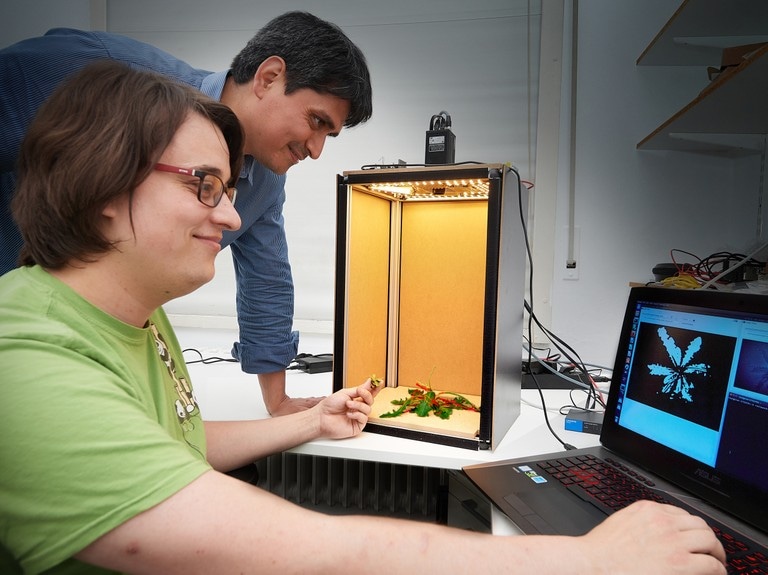Jun 9 2017
Researchers at the University of Bonn have developed a unique robotic system that eliminates the requirement for herbicides. The robot automatically detects weeds in a field and kills them using a short laser pulse. In sustainable agriculture, the use of herbicides is avoided as much as possible and this new, smart idea could benefit that particular field.
 Start-up: Tim Wigbels (left) and Dr. Julio Pastrana (right) with their weed recognition software which is detecting a plant and how the laser system is shooting and damage its foliage. (C) Photo: Volker Lannert/Uni Bonn
Start-up: Tim Wigbels (left) and Dr. Julio Pastrana (right) with their weed recognition software which is detecting a plant and how the laser system is shooting and damage its foliage. (C) Photo: Volker Lannert/Uni Bonn
Dr. Julio Pastrana and Tim Wigbels from the Institute of Geodesy and Geoinformation at the University of Bonn are convinced of this. The Federal Ministry for Economic Affairs and Energy has awarded an EXIST Business Start-up Grant for this project. Aided with this grant, the Scientists are currently advancing the development of this useful tool for field work.
Individuals who expect a rich harvest should prevent weed growth so that their crops can grow in a better way. However, in organic agriculture, herbicides are not used because they are believed to be toxic chemicals and unwanted wild plants have to be weeded out, which is a time-consuming process. If the predictions of Dr. Julio Pastrana and Tim Wigbels prove to be accurate, then this laborious work can soon be handled by robots.
Laser-based weed control can eliminate herbicides
A new system is being developed by Computer cientists in the Photogrammetry Laboratory at the Institute for Geodesy and Geoinformation at the University of Bonn. When cameras are used on an all-terrain robot vehicle or on a tractor add-on, unwanted weeds in the various crops should be automatically detected and destroyed in a targeted manner. “The robot shoots the leaves of the unwanted plants with short laser pulses, which causes a weakening in their vitality,” reports Dr. Pastrana.
It is thus predicted that we will no longer need to use herbicides on our fields and the environment will be protected.
Tim Wigbels, The Institue of Geodesy and Geoinformation, The University of Bonn
Prior to establishing the start-up, Dr. Pastrana was involved in robotics and worked on automated image interpretation methods with Professor Cyrill Stachniss from the Institute of Geodesy and Geoinformation at the University of Bonn. Using statistical models at Leibniz Universität Hannover, Dr. Pastrana completed his doctorate on the classification and detection of weeds and went on to develop an earlier model of the robot with a co-worker. Wigbels studied Computer Engineering at RWTH Aachen University and eventually worked in software development within an organization.
Now, the research group is driving forward their start-up "Escarda Technologies" for a year at the University of Bonn with the help of an EXIST Business Start-up Grant from the Federal Ministry for Economic Affairs and Energy. “It is now a case of finding investors and further developing the business plan for the start-up,” says Wigbels. Funding from the Ministry is also being used to procure the parts required to build a prototype.
Diverse support from the University of Bonn
The start-up is being supported by Professor Stachniss in many ways: Wigbels and Pastrana can use the labs at the institution and confer with the associates there. In addition, Rüdiger Wolf from Technology Transfer at the University of Bonn assisted the start-up to submit the application for the EXIST grant.
“The advice was very helpful,” says Dr. Pastrana, delighted. Both Researchers are also looking forward to take part in the start-up round tables which are being organized by Technology Transfer, with an aim to benefit from the know-how of other start-ups. Moreover, the EXIST grant allow the Researchers to participate in training programs, which can prepare them ahead for the challenges of independence.
The idea combines innovative robots with a current sustainability topic.
Rüdiger Wolf, Technology Transfer, The University of Bonn
According to him, the analyses of the competition and market for such an application are very promising.
The advantages of the laser-based method for new agricultural machinery have convinced Pastrana: “Our aim is to contribute to achieving more sustainable agriculture.” Both founders received an award for the best start-up idea at the Bonn Idea Exchange by the Bonn/Rhein-Sieg Chamber of Commerce and Industry.